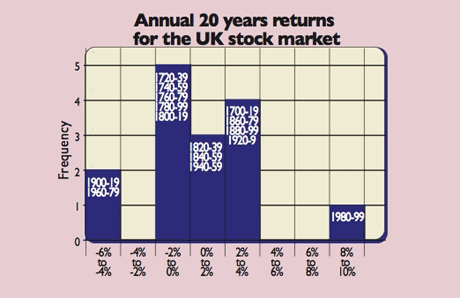A freakish piece of research surfaced at the end of October. According to Bianco Research of Chicago, the investment returns from US Treasury bonds had beaten those from US common stocks over the past 30 years. That hasn’t happened since before the American Civil War.
Could the attractiveness of equity investing be overstated? I believe it is. Either that or the inherent riskiness of stocks is hugely understated by the media and financial services firms.
As someone whose background was in the credit markets – I was an institutional bond salesman before becoming a portfolio manager – I freely concede that I never drank the equity-market Kool-Aid. And I have always struggled with the ‘stocks for the long run’ thesis. The stockmarket is a road map to yesterday’s winners. It tells us next to nothing about the future, only where investor overconfidence, or lack of it, is most visible today.
The bond market, meanwhile, for all its faults, is an oasis of sense and rationality by comparison. Faddism, over-exuberant hucksterism and the power of sheer story-telling just don’t subsume it in the same way.
I have long found the popularity of equity investing baffling, given the attendant risks. I suspect it’s a function of the all-powerful marketing clout of the institutional fund management and brokerage industry, which is itself not exactly immune to the forces of aggressive hucksterism and the cool intellectual objectivity of the fun fair. If you really can make a fortune from stocks in a relatively short period (and I admit that it’s possible, although you have to be either terribly smart, extremely comfortable with volatility, or very, very lucky), why not promote the fact? The problem, however, is that the longer-run returns from stocks are altogether more debatable.
Take the chart shown below of UK equity-market returns over the past three centuries. You can see the market broken down into two-decade segments. The chart, as you would expect, looks a little like the hypothetical ‘bell curve’, with returns clustering at either side of the middle.

That should be your first warning sign. The middle of the chart equates to a stockmarket return, over a 20-year period, of roughly zero. More to the point, there is only one 20-year period – 1980 to 1999 – where UK stocks delivered meaningful positive real returns nudging the double digits. Throughout the history of the market, those sort of returns have never appeared before, and 300 years can, surely, be treated as sufficiently ‘long run’ for our purposes.
So why do so many financial advisers favour stocks? My answer is because they all worked during that most recent period, 1980 to 1999, when UK equity-market returns were tremendous. But that two-decade period is a huge outlier. In 300 years it has only occurred once.
Of course, if you torture statistics enough, they’ll confess to anything. But the long-term stockmarket data also conceal some telling stories; namely, the fate of companies that were once worth something, but have since disappeared altogether. Think of Enron, WorldCom, and Lehman Brothers. Entire stockmarkets can disappear too, like those of Russia and China after their respective revolutions. So the riskiness of stocks is not necessarily well understood. One other thing I find mystifying is the apparent robustness of the stockbroker business model. There was a time when you needed a broker to place orders on the market. Commissions were high, and were invariably disguised or bundled up with ‘advice’, of variable quality. Years of deregulation and competition have seen to that. Now it’s practically free to trade on an exchange, on a self-directed basis. So why do advisory stockbrokers survive and thrive?
My scepticism about stocks may be overdone. But I harbour grave doubts about the integrity of our markets. Ironically, the focus of the financial crisis has been on debt, not equity. But precisely because of the liquid nature of the stockmarket and the vulnerability of the share prices of listed businesses to sharp swings in investor psychology, the equity market, I suspect, will not survive this credit crisis entirely unscathed.
That is not to say that stocks are unworthy of investment – but that we owe it to ourselves and our dependants to appreciate the risks.
As a multi-asset investor, I already have plenty of alternatives to consider on behalf of my clients. High-quality bonds, for example (they do exist). Assets that are uncorrelated to stockmarkets – including systematic trend-following funds, insurance-linked vehicles, and infrastructure investments. And foreign currencies, including the finest currency in the world, gold.
The media’s relentless focus on stocks is irritating and deeply distracting. For those of us with mortgages and pensions, the news bulletins would be providing a better service by reporting gilt yields. But then, how exciting is that? Actually – given the severity of the global debt crisis – perhaps that’s more exciting than we may think.
• Tim Price is director of investment at PFP Wealth Management. He also edits The Price Report newsletter. Contact: 020-7633 3637.
Category: Market updates

